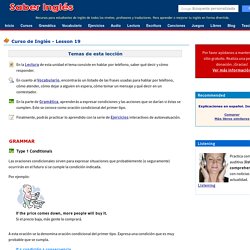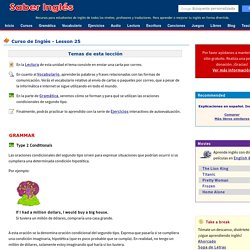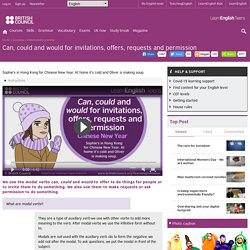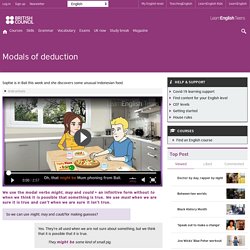

16/03-27/03. Lesson 19 - Grammar. Temas de esta lección En la Lectura de esta unidad el tema consiste en hablar por teléfono, saber qué decir y cómo responder.

En cuanto al Vocabulario, encontrarás un listado de las frases usadas para hablar por teléfono, cómo atender, cómo dejar a alguien en espera, cómo tomar un mensaje y qué decir en un contestador. En la parte de Gramática, aprenderás a expresar condiciones y las acciones que se darían si éstas se cumplen. Esto se conoce como oración condicional del primer tipo.
Finalmente, podrás practicar lo aprendido con la serie de Ejercicios interactivos de autoevaluación. Type 1 Conditionals Las oraciones condicionales sirven para expresar situaciones que probablemente (o seguramente) ocurrirán en el futuro si se cumple la condición indicada. Por ejemplo: If the price comes down, more people will buy it.Si el precio baja, más gente lo comprará. A esta oración se la denomina oración condicional del primer tipo. If + condición + consecuencia If + Present + Future Simple. Lesson 25 - Grammar. Temas de esta lección En la Lectura de esta unidad el tema consiste en enviar una carta por correo.

En cuanto al Vocabulario, aprenderás palabras y frases relacionadas con las formas de comunicación. Verás el vocabulario relativo al envío de cartas o paquetes por correo, que a pesar de la informática e internet se sigue utilizando en todo el mundo. En la parte de Gramática, veremos cómo se forman y para qué se utilizan las oraciones condicionales de segundo tipo. Finalmente, podrás practicar lo aprendido con la serie de Ejercicios interactivos de autoevaluación.
Type 2 Conditionals Las oraciones condicionales del segundo tipo sirven para expresar situaciones que podrían ocurrir si se cumpliera una determinada condición hipotética. Por ejemplo: If I had a million dollars, I would buy a big house.Si tuviera un millón de dólares, compraría una casa grande. Conditionals. We use conditional sentences to say one thing depends on another. They can be used to talk about real or imaginary situations. One of the clauses starts with if (or a similar word) – this is the conditional clause. The other clause talks about the result of the conditional clause happening. Don’t worry, it’s a lot easier than it sounds. Let’s look at some examples. If you don’t tell me, I’ll just keep asking.If I promise to travel less, will you forgive me? I know that one. That’s right. And can you change the order of the clauses round? Yes, and we leave out the comma in the middle of the sentence if the order is changed round.
30/03/2020-10/04/2020. Can, could and would for invitations, offers, requests and permission. We use the modal verbs can, could and would to offer to do things for people or to invite them to do something.

We also use them to make requests or ask permission to do something. They are a type of auxiliary verb we use with other verbs to add more meaning to the verb. After modal verbs we use the infinitive form without to. Modals are not used with the auxiliary verb do; to form the negative, we add not after the modal. To ask questions, we put the modal in front of the subject. Hey, you couldn't pass me that plate, could you? Modals do not change in the third person singular form (he/she/it) in the present simple.
Sophie can send photos. Modals seem quite easy to use. We use them for lots of different things, and the same modal verbs can have several different uses. Right, fire away! Oh, you’re giving me permission. Would you like to come to our house for dinner? For more informal invitations you can use can + get. Can I get you a drink? Would you like some help? Can you do me a favour? Modals of deduction. Daisy: This is so good.

I … Oh, that might be Mum phoning from Bali. I’ll put her on speaker. Hi, Mum! Ollie: Hi, Mum! Sophie: Ah, you’re both there, good. Daisy: We’re fine. Sophie: Really good. Ollie: Don’t make us jealous, Mum! Sophie: Sorry, love. Daisy: A quiz? Modal verbs exercises. CFA Vilaseca: Log in to the site. 14/04/2020-17/04-2020. CFA Vilaseca: Log in to the site. Conditional sentences - Complex Test - English. 20/04/2020-24/04/2020. Past perfect exercises. Mixed tenses exercises. 27/04-08/05. Articles exercises: a, an - English grammar. Infinitives and gerunds. 11/05/2020-22/05/2020. Third conditional exercises - Conditional sentences type III. Adverbs or adjectives exercises.